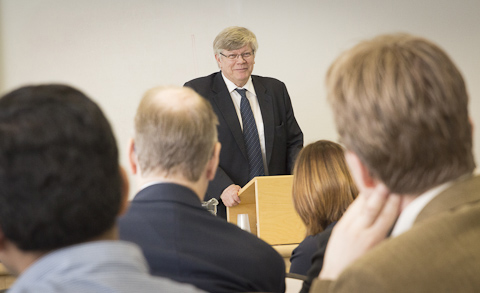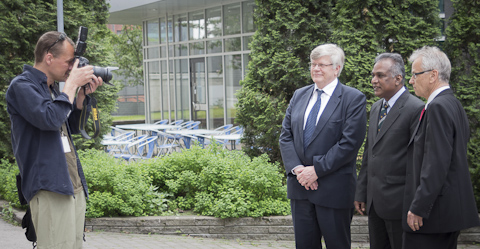Diagnostics will be developed by Indo-Finnish collaboration
30.05.2013
Newly founded Indo-Finnish research center for dignostics will search for new and affordable solutions for medical diagnostics. The work of Indo-Finnish Diagnostic Research Center will consentrate on the area of diagnostics for human health as well as environmental and food safety diagnostic. The associated market potentials are substantial.

Rector Kalervo Väänänen didn't hide his contentment at the opening ceremony of the center.
A major worldwide trend strives to bring medical diagnostics close to the patient to be performed at a doctor’s office, in an ambulance, in emergency rooms or at home. Savings and advantages for both the society and patients, especially in the preventive health care sector, are obvious.
In India, the need of new innovations is highlighted. With a population of 1.2 billion the country is among the fastest growing economies in the world. Despite of the country’s fast economic growth, it still remains a country of opposites. Roughly 70 percent of the country’s population resides in the rural areas with limited access to healthcare.
The infrastructure and trained personnel in these areas are practically non-existent and, therefore, there is strong need for solutions that are not only affordable, but also easy to deploy, that do not require sophisticated instruments or cold chain for transport or storage.
Despite the clear differences between developing and developed countries (such as India and Finland), the expectations on novel diagnostic innovations and platforms are highly similar. The associated market potentials for new diagnostic innovations are substantial. For example the diagnostics market in India was $700 million in 2010, with a growth rate of 15-20 percent per annum and the trend is likely to continue for the next 10 yrs.
The aim is to develop and market
The goal of the Indo-Finnish Diagnostic Research Centre (IFDRC) is to complement and enhance the research capabilities of its Indian and Finnish scientific networks from academia and industry in the area of diagnostics. This collaborative effort between India and Finland is set to enable innovation and facilitate collaboration in diagnostic research and development between academic and industrial players in both countries.
The two countries, through Translational Health Science and Technology Institute (THSTI) under Indian Ministry of Science and Technology and University of Turku, Turku, Finland have agreed that the center has two locations: one at THSTI, Delhi and one at the University of Turku.
The aims of the new research center are two-fold.
Firstly, the intention is to stimulate the exchange of both junior and advanced students and researchers between the countries around common collaborative endeavors and research topics. As of August this year, five Indian post-doc researchers supported by THSTI will join their colleagues in Turku (University of Turku and VTT) for 2-3 years after which they will join THSTI while maintaining collaborations with the Finnish partner organisations.
Second goal of the center is to stimulate and promote interaction between Indian and Finnish companies and will also facilitate creation of bilateral joint ventures to address the need for indigenous and affordable diagnostics. This will be achieved using various tools ranging from incubator services and facilitation of Indo-Finnish start-up ventures to a shared database of discovery-phase ideas for new diagnostic innovations.

Rector Kalervo Väänänen, Ambassador Aladiyan Manickam and Professor Kim Pettersson
Research Finnish center is located in Turku
The long and active academic collaboration between the Division of Biotechnology, the University of Turku and the Translational Health Science and Technology Institute and associated research organizations in India, and the internationally recognised expertise in diagnostic research in both academia and industry, has made University of Turku a natural choice for the location of the newly formed research center in Finland.
Additional funding will be applied for the function also from the private sector and foundations. Tekes – the Finnish Funding Agency for Technology and Innovation- and its Indian counterpart the Department of Biotechnology (DBT) and the Academy of Finland have since 2006 supported Indo-Finnish diagnostic research through numerous project calls. Future and major funding options will be available from international organisations, such as the Horizon 2020 - The EU framework program for research and innovation and the Bill & Melinda Gates foundation.
The Indian and Finnish branches of the new IFDRC welcomes Finnish diagnostic actors in academia, independent research institutions, as well as, funding organisations to join the efforts to build innovative scientific networks and to carry them into successful implementations
EH
Photographs: Hannu Aaltonen